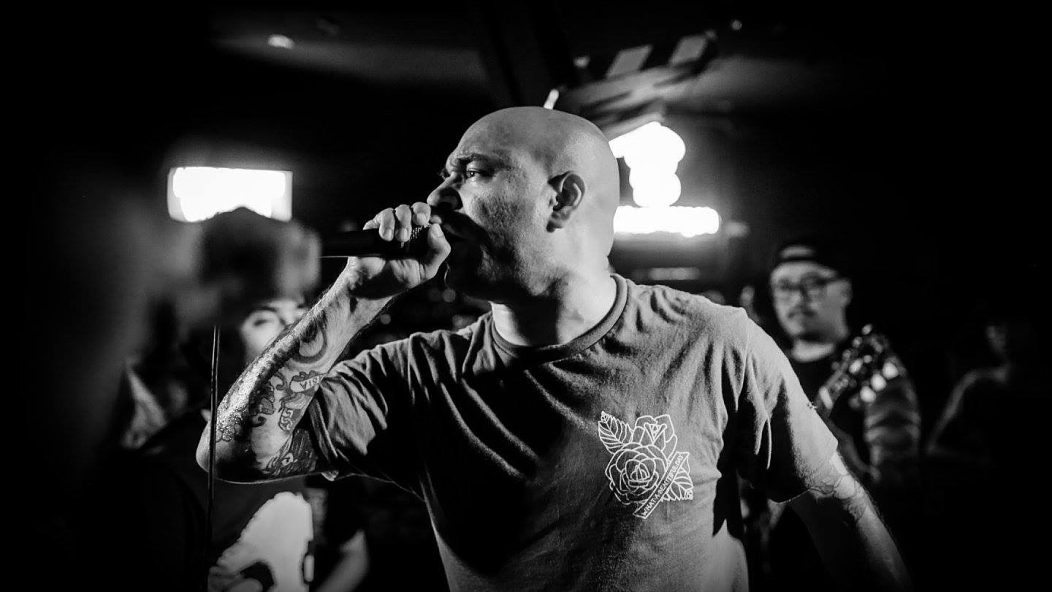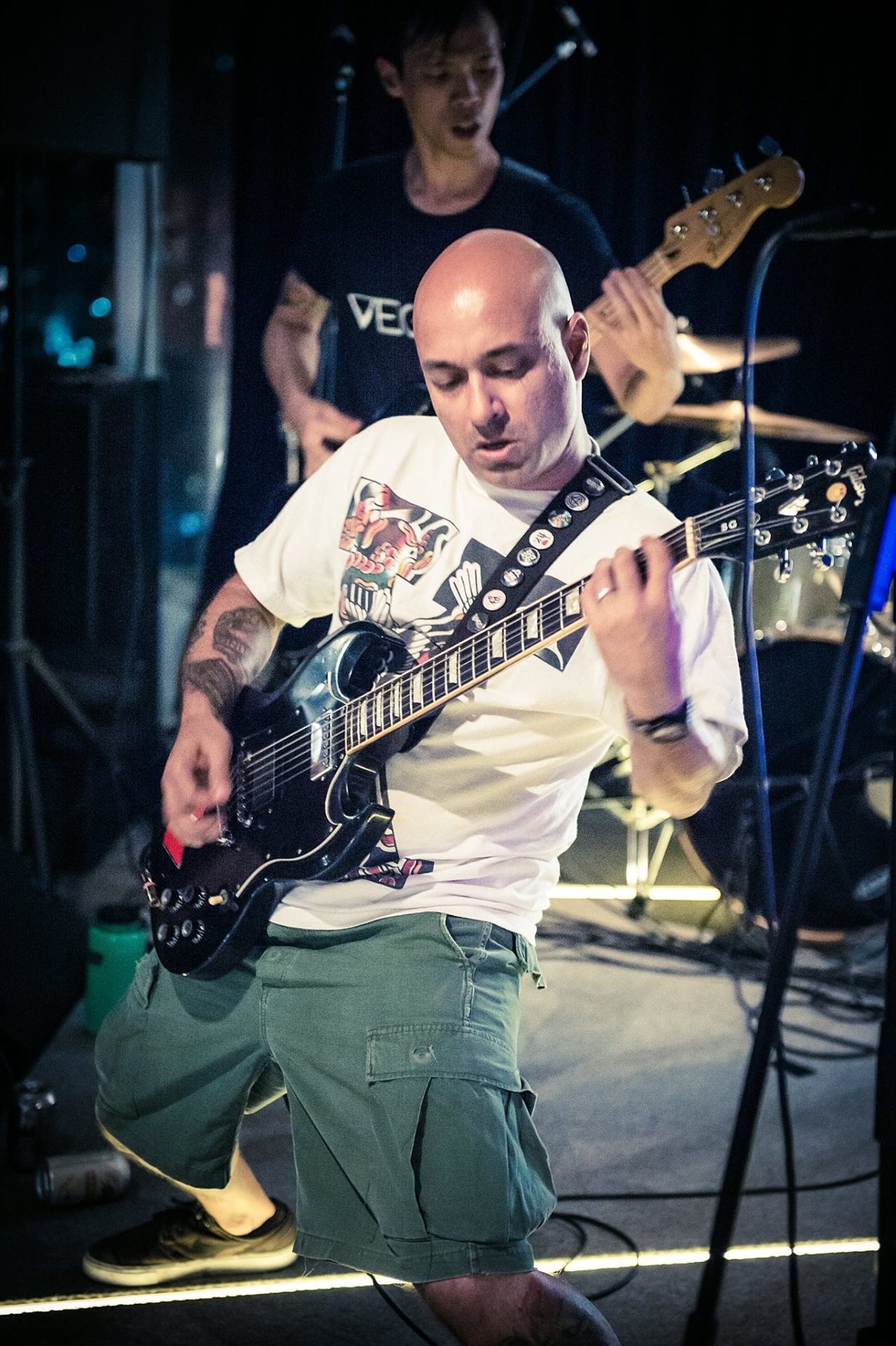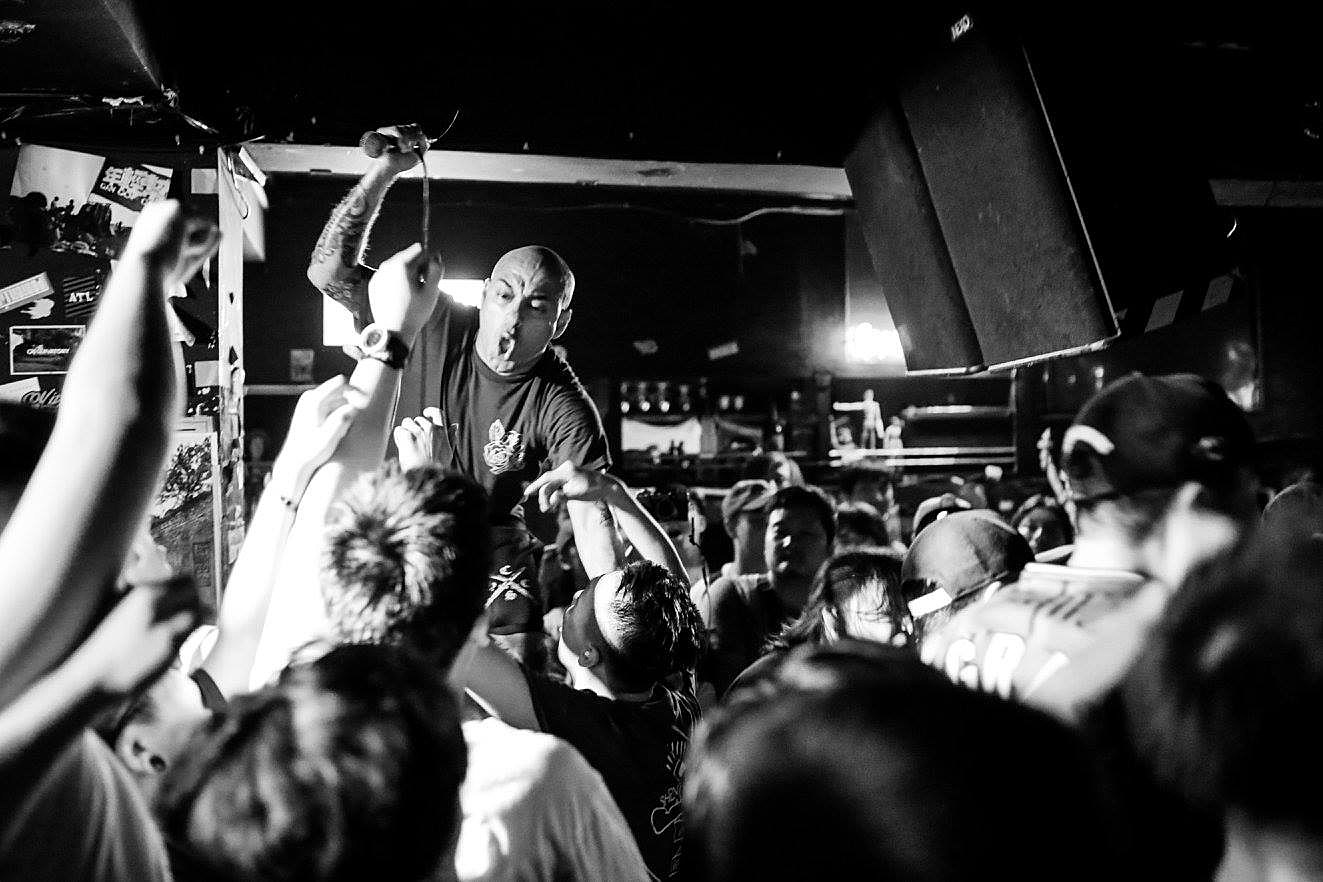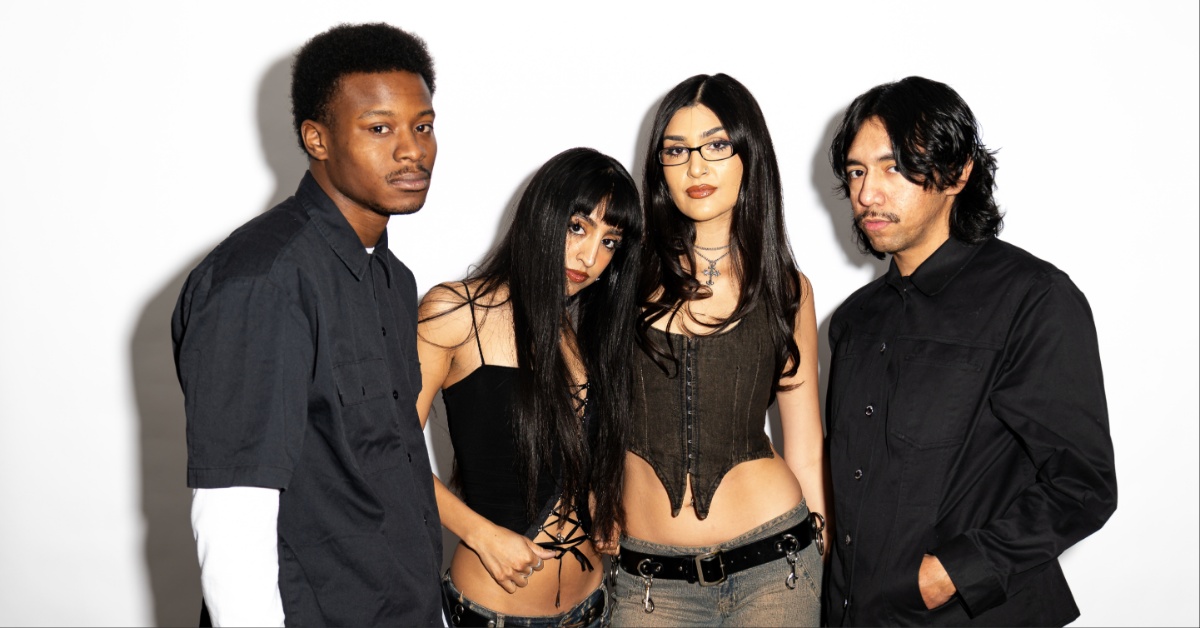
Riz Farooqi Carries The Torch For Hong Kong Hardcore
…
For nearly two decades, Riz Farooqi has served as the steadfast champion of hardcore in Hong Kong. Start From Scratch, the name he chose for his DIY zine back in 1999, is an apt representation of his quest to promote and spread hardcore music throughout Hong Kong and the rest of Asia. As frontman of the influential Hong Kong hardcore band King Ly Chee, Farooqi has taken his passion for the music across the world – even supporting hardcore legends Sick of It All on their 30-year anniversary US tour.
Seeking to do more for other heavy bands in Asia, Riz launched Unite Asia in 2015. The website is the focal point for Farooqi’s mission to showcase the multitude of hardcore, punk and metal bands across Asia who, in his eyes, are too often overlooked by the vast majority of music journalism outlets and press.
When several of his bandmates in King Ly Chee called it quits earlier this year, Farooqi wasted no time sitting around and pining for what had been lost. Instead, along with other veterans from Hong Kong’s hardcore scene, he formed metallic hardcore group Dagger. Though they’ve only been together a short while, the band has already released an EP and music video with no sign of letting up.
…
…
At what point in your life did you get into heavy music? Do you remember the first album that did it for you?
Oh – I was very young. I don’t remember the exact point, but I have a very vivid recollection of a few things happening around the same time that I was a kid in Hong Kong. One of the things that I vividly remember is sitting in front of my television, and suddenly a black and white image comes on the television with a bunch of dudes with very long hair. Next thing you know, someone plugs his electric guitar in and starts one of the world’s most memorable riffs…I was watching Guns N’ Roses’ “Sweet Child O’ Mine” video. This was in the late 80’s or whenever it came out. I have no idea what brought me to the television right at that moment that song came on for the first time in Hong Kong…but there I was watching.
I remember going out to buy my very first cassette too, which was Van Halen’s 5150 cassette. From then on, I remember going back and forth between two cassette stores in Hong Kong trying to get my hands on every AC/DC and Iron Maiden cassette…it was such a beautiful innocent time of just trying to get my hands on all this guitar-driven music. From then on, my interest and love for the music just grew and grew, and it grew heavier and heavier as well. Transitioning from Guns N’ Roses, AC/DC, Van Halen, and Mötley Crüe to Iron Maiden, Anthrax, Metallica, and Slayer to Pestilence, Death, Obituary, and Napalm Death.
What led you towards the creation of your Hong Kong-based hardcore zine Start From Scratch?
That was because I had left Hong Kong in 1994 to attend university in the US, where I lived until 1999. During my time there, I fully immersed myself into the world of punk rock and hardcore. I mean fully. I put on shows, helped touring bands, played in bands myself, released music on cassettes and then vinyl, had to deal with distributing all that, had to cold-call venues around my area to get my band a chance to play, etc. It was all hard work based on the ideals of the DIY culture that is such an integral part of punk and hardcore.
When I had to leave the States – I was on a student visa in the US and couldn’t find a job that would sponsor me, so I had no choice but to leave – and moved back here, the first thing I wanted to see was if there was any sort of punk or hardcore scene here. To my surprise, barely anything existed.
Hong Kong is also quite a complicated place. Most people probably know that Hong Kong was once ruled by the British, so in this time there have always been two very different parallel worlds that inhabited the city: the expat world and then the local Hong Kong world. In the ‘90s, the expat world of international school kids actually really took to punk rock. They were amazing – releasing zines, releasing music, tons of really great bands, etc. But within the local population, punk rock never really got embraced. So when I moved back in ‘99, what I really wanted to learn about was the state of punk/hardcore amongst the local Hong Kong population – the population that makes up 96% of Hong Kong! It’s important that this world was involved.
So what I did was really sit and analyze how I could do my part to get punk rock into the local population. Then I realized that one major factor was language. A lot of the zines that were available here in the ‘90s like Maximum Rock N’ Roll and Heartattack are cover-to-cover in English – the local Hong Kong population is much easier to break into if you speak Chinese. So that’s when it hit me that maybe I need to start a zine that was written in both English and Chinese. And that was the catalyst for the zine…I had no idea how the zine was going to be embraced, man! Holy shit…it was amazing.
It wasn’t easy to do because at the time I couldn’t speak or write in Cantonese, so I needed someone to translate all my articles. It was hell, man…I also felt bad chasing people up when they had their own full-time jobs. But it was all worth it, because since the language in the zine was more accessible to people, the impact was so much more long-lasting.
…
…
At what point did you decide that you needed to start creating your own music? What motivated you to get King Ly Chee together?
King Ly Chee started because along with the words in the zine, I felt like people needed to see, feel and hear a punk or hardcore band live to really understand the power. Much like in quite a few places in the world, the simplicity of punk rock really isn’t something that attracts people here. People here would much rather hear stuff with more technical riffs and song arrangements. Even when I was growing up here, punk didn’t appeal to me. It was not until I moved to the US and watched a punk show in front of my own eyes that I was fully converted. The energy behind punk and hardcore is unparalleled live.
What are some of the most memorable experiences you’ve had with the band?
Eighteen years is a long time to really reflect on. Off the top of my head – being asked by Sick of It All to come out to the US to open their 30-year anniversary dates. That was fucking unbelievable. In 2007 I helped organized some of the NOFX Asian tour dates, and my band got to open that whole tour. Every night Smelly and El Hefe sat behind our drummer and watched us play. That was awesome.
Last summer when we were in the States touring with Sick of it All, we stopped by the famous Dischord House – the same house that Minor Threat and Fugazi practiced in, wrote songs in, recorded in. We went there just to take a band photo on the Minor Threat stoop. When we got there, I rang the doorbell, and fucking Ian Mackaye came and opened the door! And then he proceeded to show us around the entire house and spent like an hour or so talking to us about music. Fugazi played in Hong Kong in the 90’s, so we even talked about that experience. I don’t get star-struck often, but I was shaking that entire hour or so.
What led to King Ly Chee’s current hiatus?
The past couple years in general have been quite tough for me personally. I just felt like no matter where we went, we weren’t getting as a great of a response as we used to. So those shows started getting tougher to play and certainly not as fun anymore. There were a couple tours, especially in 2015, that were just tough to get through. In January of this year, we all sat down and talked, just to see where everyone was, and it seemed we all needed a bit of a break to kinda get that passion back for the band. There was no talk about ending the band – just a nice long break that could’ve lasted a year or more.
In the meantime, the drummer Ivan and I started another band because I’ve been playing music my entire life – it’s pretty hard to not be writing or playing shows. But in May this year, suddenly we received a message from the other cats in the band that they decided they were leaving the band all together. Came as a shock to me, but I couldn’t blame them. I’ve gone through so many member changes in 18 years that I knew I had a choice to make: either go find three new people or just call it quits. I really did not want to find three new people and have to go through all of this all over again, especially when there really hasn’t been much love for the band coming from any pocket in the world.
All of this combined led me to make the decision to end the band. I thought it would’ve been a tougher decision, but it wasn’t at all. I was very relieved when I was able to pull the plug. Over the next two weeks or so following the announcement, people were leaving really wonderful messages up on King Ly Chee’s Facebook page. It’s been nice to see how much the band impacted their lives.
…
…
You’ve since gotten involved with a new project, Dagger. What’s Dagger all about?
As I mentioned, the idea of this band started in January of this year. It came about from an intense period of reflection on my part. I just wanted to know why, after 18 years of giving it my all to Hong Kong, hardcore punk still wasn’t as embraced as I had hoped for. Actually, for a good almost five years, there really was a very strong local hardcore scene. Packed shows, stage diving, good bands, lots and lots of passion. And then slowly it all fizzled out. But the past few years especially have been quite difficult to garner any interest in shows we put on. Here’s an example – a pretty influential hardcore band called Have Heart came through Hong Kong, and only 43 people showed up.
What I wanted to do was figure out what the vibe was of the early 2000’s that moved people in Hong Kong. For a band to feel disconnected with their own hometown is really quite painful. All I knew was that if I was going to start a new band, I had to try something different. It couldn’t be King Ly Chee Part II. So what I thought about was going back to my roots – I grew up as a metalhead. I went back to writing music that was more riff-based but still fit under the world of hardcore. The music is much heavier but lyrically, it’s similar content-wise to King Ly Chee.
I will always be most moved by bands that have something to say. Bands like Sick of it All have always meant the world to me because their lyrics were so relatable. Dagger continues in that tradition of hardcore – singing about sociopolitical issues that we deal with daily.
How does your experience with Dagger compare with what you were doing in your previous band?
It’s hard to say. Dagger has only been around for seven months, so we’re still in that “honeymoon” phase where everyone loves each other! But in general, there is a lot that I’ve learned about being able to work with groups of people in any entity – whether it be at work or in bands. There is a different attitude I’m using with the guys in this band. Luckily, we’re all older, so we all have the “get shit done” mindset. When we get together it’s certainly fun as hell, but very productive. In seven months we’ve written material, recorded it and even released an EP. Over the next few months we’re going to play as much as possible and start gathering enough material for our debut full length.
…

…
How would you characterize the active bands in Hong Kong as well as the involvement of the fans coming to see them?
Hong Kong has a pretty active independent music community. It’s really pretty cool because compared to when King Ly Chee first started in 1999, people are more into getting out there and making things happen for their band. In the old days, bands just sat around waiting to be invited to shows. Now, people go organize these things themselves and put out their own music. The internet has certainly made promoting your band so much easier.
Bands are still into releasing albums though, but I see that slowing down with more bands enjoying releasing one single at a time. That’s just the sign of the times…very rarely do people listen to complete records anymore. Most people flip in and out of music a couple tracks at a time now because they’re using something that holds thousands of songs. It’s not like the old days where you carried a Walkman and maybe like three cassettes in your pockets.
In terms of music styles though, the stuff that does really well here is post-rock and metal. I’m talking about in the underground, not mainstream. If you’re talking about the mainstream world, it’s pop-rock and post-rock. Hardcore and punk rock have a very small niche market here.
What sort of infrastructure or industry is there across Asia for heavy bands? Is it more of a DIY approach?
Oh, it totally varies, man. Places like Indonesia and Japan really have very strong networks for bands, which includes management, labels, promoters, brands/companies, media contacts, access to club shows, access to festival shows, etc. All of this really gives bands the help they need to take their music and band much more seriously. Other places have very passionate organizers and audiences that support heavy bands, like in Nepal, India and Bangladesh. None of these places have bands that can probably live off their music yet, but they have enough of a hometown following that really helps keep that fire burning. It’s pretty sick.
Then, in other places, it depends on what type of heavy music you’re talking about. Taiwan is really into more contemporary metalcore bands, so foreign metalcore bands get invited to big events like Taiwanese music festivals. China is its own beast. Metal has been alive there for decades, so there are the true old-school metalheads who are very big in supporting anything that is more traditional-sounding. In China, there is a pretty strong network with promoters, venues, websites, etc., but the issue is with work permits and getting bands on slots or tours that are well attended and resourced. Work permits are issued by the Ministry of Culture who require lyrics, band background, website links, music all sent to them so they can comb through it to make sure the band has nothing “sensitive” about them.
But for the rest of Asia, it really is DIY to the bone. People play the music they play because of the love for the music, that’s it. No one is in a fantasy world thinking that at some point they’ll be able to tour the world or make a living from it. Though that mentality is pretty depressing, at least it makes the music really pure and from the heart.
We’ve just seen China marking the 20th anniversary of the Hong Kong handover in 1997. Is there a role or a place for hardcore music in the political conversations that are happening amongst Hong Kong’s young people?
It’s one of those things that boggles my mind the most. We are in such political upheaval in Hong Kong and have been for almost 10 years. You would think this was ample reason for people to embrace more in-your-face music like punk rock and hardcore. But they really haven’t. I just think it comes down to the actual “sound” of this type of music that is not appealing. People here like stuff that sounds nice – music that is produced well. Anything raw is almost an instant turn-off.
…

…
Let’s talk about Unite Asia. What’s it all about, and what are your goals for the project?
It’s very simple. I am a fan of music. Every morning I get up, and the first thing I do is scroll through all the different music websites and blogs. After a while, I was just bummed that these sites only ever talked about American bands. Having toured through Asia countless times with King Ly Chee, I knew tons of great bands in the region could certainly give these American bands a run for their money. How come I wasn’t reading about a band in Malaysia’s latest release? Or a band from Japan going on tour in the area? You know – stuff from this part of the world!
I said, “Fuck it – I’m going to start my own site using the contacts that I have with the incredible bands that I’ve befriended over almost the two decades I’ve been involved here.” And that’s it. I had no idea it was going to take off the way it has.
You update Unite Asia multiple times a day, every day. What keeps you going?
The pure joy of giving bands from the region the much-deserved exposure that they should be given. I mean, have you heard the bands that we put up on the site? They’re fucking phenomenal! Then when these bands see their post up on the site, and the immense gratitude they have seeing their band from some small village in Indonesia up on an international website, it just keeps fueling the passion.
Between your tours as a veteran musician and your current activity with Unite Asia, you’ve surely gleaned plenty of insights into heavy music scenes across the region. Can you speak about the heavy music scenes outside of HK, and how they might vary from place to place?
I would say that there are certainly pockets of music that does well in different parts of Asia. The one constant is that metal does well everywhere. But there are parts of Asia where modern metal does better than old-school metal. This is certainly true in places like Hong Kong and Taiwan. Then there are pockets of places that hardcore really does well – like Singapore, Indonesia and the Philippines. There are also parts of Asia that have very strong histories in punk and hardcore and thus know their shit very well. Like Southeast Asia – there aren’t just “hardcore” bands there – there are blackened crust D-beat powerviolence bands. Shit gets really specific down there, whereas up here in Hong Kong we just call it all punk or hardcore.
What advice would you give to people looking to get involved with heavy music in their own parts of the world?
Hard to say. I think I’ve learned tons of lessons playing in bands and trying to do shit for my own community. First of all, you just need to know the specific culture and traditions in your city or country within which you’ll be working. Asia is a place with thousands of years of history, so coming at hardcore while ignoring the historical, cultural, and lingual traditions of your world is a really stupid move. Then of course, is finding the right people to play in a band with. People that you’re actually going to want to be around for hours and days and years at a time!
Can you bring up some of your favorite bands from across Asia?
That’s a hard one to answer because there are so many bands releasing music daily that blow my mind. I think maybe what I can do is list bands that have really caught my attention recently.
Indonesia’s Stand Clear is one that just amazes me. Good old-school catalog of songs that are insanely well written. Japan’s Unregenerate Blood have just released their second full-length, and the way the band has progressed is so evident all over this release. The fucking record is great from start to finish! Taiwan’s Deadpan has been a favorite since they first exploded into my life last year with the track “Rat”. Great band especially if you’re into that Expire, Backtrack sound. My current favorite grindcore band Self Deconstruction out of Japan. Fuck – these ladies kill it!
Goes without saying, my favorite Asian punk band of all time is China’s SMZB. I’ve known Wu Wei since 1999, he is a brother of mine for life. Little did I know back then how much of a punk rock icon he was going to become – and how humble he is about it.
Metal was always the first thing that I got into growing up as a young kid, so that will always be my underlying love and of course Asia, much like the rest of the world, has millions of metal bands worth gushing over. Singapore’s Rudra – dope band that does a great job trying to incorporate more Eastern influences without sounding too cliché. They’re about to release a new music video, and I can’t wait to see that!
From right here in Hong Kong – my favorite, Evocation. The band is light years ahead of their time coming up with metal that pushes the envelope with the riffs they come up with and song structures. They’re going to be releasing a new album this year…it’s going to be the best thing to come out of Hong Kong in like for-fucking-ever.
…
You can follow Dagger on Facebook. Find out more about Unite Asia here.
…











